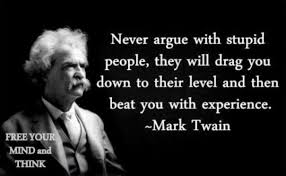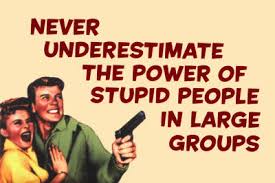
Good Day World!
Regardless of the way some of us act, no one is perfect. That's where stupidity comes in. Because we know we're not perfect we often try to cover up our mistakes, or even the mistakes of others.
That's stupid because everyone knows their time to screw up will come. It's as inevitable as taxes and death. I won't even attempt to number the stupid mistakes I've made in my life. I sometimes talk about my stupidest failures and joke about them, hoping to get a smile or laugh that could help take away the sting.
James F. Welles, Ph.D, the author of "Understanding Stupidity: an Analysis of the Unnatural Selection of Beliefs and Behavior in Institutions and Organization," wrote that not all failures are stupid.
It seems in a behaviorist's universe, there is no such thing as stupidity. Behavior, Welles asserts, "is simply (or complexly) caused, and the corruption of the learning process and limitations on a living system's ability to adapt are inherent in the process of life."
An understanding of how stupidity affects us could make us better people. We call self-deception stupid because we ignore facts that could help or hurt us. For example, say you're a politician arguing there's no such thing as "Global Warming" and you find new relevant information that proves otherwise.

What do you do? Change your position to reflect the truth or ignore it to further a political agenda? If you do the latter, you are stupid, greedy, or you have a broken moral compass.
Facts enlighten us and result in clear thinking. Accepting facts is acknowledging the truth. To turn away from facts is stupid. But not everyone is interested in the truth.
Researchers at the University of Michigan conducted a series of studies in 2005 and 2006 and found that misinformed people, particularly political partisans who were exposed to corrected facts in news stories, rarely changed their minds.
You want to hear something even more scary? People often become even more strongly set in their beliefs when confronted with facts. It was clear to the researchers facts do not cure misinformation. In a real twist, they found that facts could actually make misinformation even stronger.
Brendan Nyhan, a political scientist and lead researcher on the Michigan study said, "The general idea is that it's threatening to admit you're wrong." In my book, that qualifies as stupid and vain. Most Americans lack even a basic understanding of how our country works.

A bold assertion, but Princeton University's Larry M. Bartels argues, "the political ignorance of the American voter is one of the best documented data in political science."
Combine that information with the fact that misinformed people often have the strongest opinions, and you have the ingredients for being stupid and proud of it.
James Kuklinski of the University of Illinois at Urbana-Champaign refers to this kind of response to reality as the "I know I'm right" syndrome, and considers it a "potentially formidable problem" in a democratic system.
It implies that stupid people resist correcting their beliefs. I believe people with good self-esteem are more able to accept it when they're wrong about something.

People who are insecure or feel threatened can't move on when confronted with facts. Researchers have found these people are less likely to listen to dissenting opinions, and they are more easily controlled.
If you have the time, check out "Stupidity: Exploring the Nature of Stupidity in Western Society -- and our Perception of It," a documentary film made in 2003, and directed by Albert Nerenberg.
Finally, we have institutional stupidity where we let lawmakers lead us into stupid wars that drain our economy. The cruel thing about all of this is the poor people who suffer through one stupid failure after another as our politicians continue to raise the bar in being stupid.
As It Stands, as Forrest Gump so aptly put it, "Stupid is as stupid does."
-By Dave Stancliff
(This column originally ran in The Times-Standard on August 1st, 2010.)



